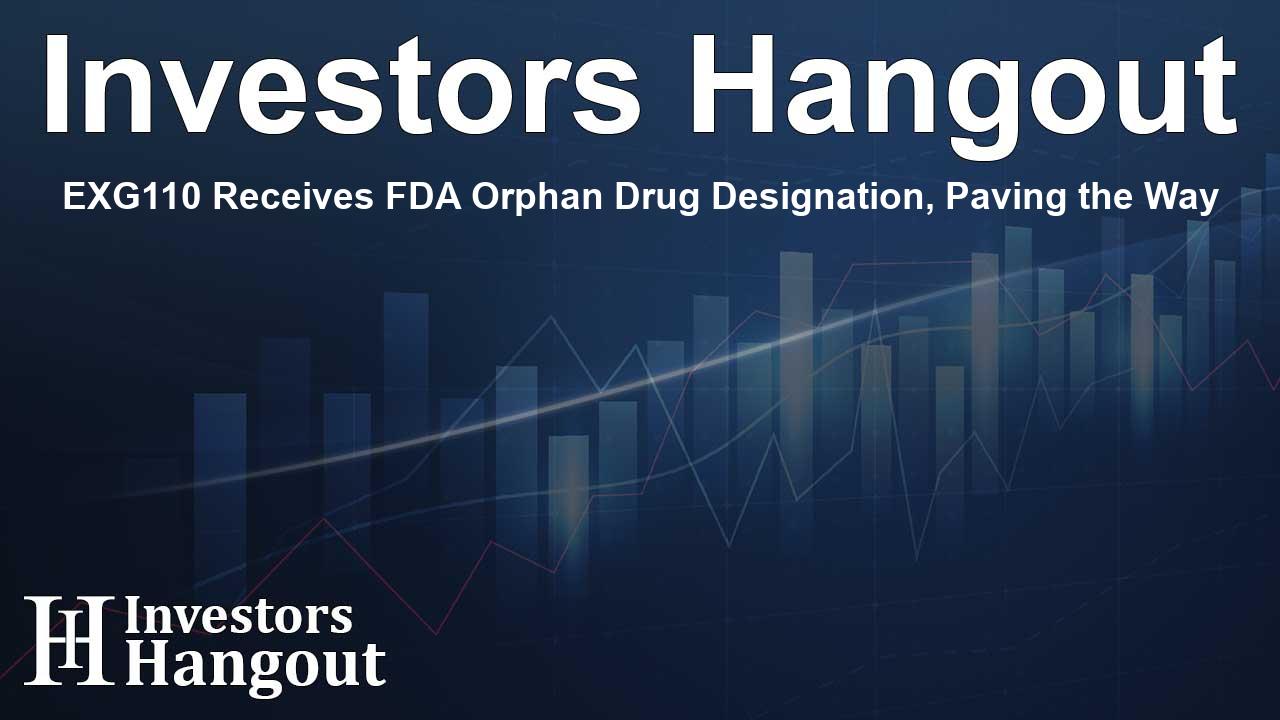EXG110 Receives FDA Orphan Drug Designation, Paving the Way

EXG110 and Its Orphan Drug Designation
Exegenesis Bio, a pioneer in innovative gene therapies, recently achieved a significant milestone when the US FDA granted its gene therapy, EXG110, Orphan Drug Designation. This novel treatment is being developed for Fabry disease, a rare lysosomal disorder characterized by harmful lipid accumulation in various tissues. Such buildup can lead to critical complications such as renal failure, cardiovascular issues, and strokes.
The Significance of Orphan Drug Designation
The FDA’s Orphan Drug Designation aims to encourage the development of treatments for rare diseases, impacting fewer than 200,000 individuals. This designation offers various incentives, including tax credits for eligible clinical trials and exemptions from certain user fees. Moreover, it grants the potential for seven years of market exclusivity post-approval, which can significantly enhance a company's market presence.
Innovations in Gene Therapy
EXG110 represents a breakthrough in treating Fabry disease, designed as a one-time therapy that delivers genetic material directly to the heart and liver cells. By ensuring improved efficacy and safety, this treatment aims to reduce the frequency and complexity of dosing for patients. Recently, the first patient was dosed as part of a clinical trial in China, with plans for a US trial on the horizon.
Insights from Leadership
Dr. Zhenhua Wu, CEO of Exegenesis Bio, expressed enthusiasm about the FDA's decision, emphasizing the importance of finding better treatment options for those affected by Fabry disease. He reiterated the commitment of Exegenesis Bio to address the needs of patients suffering from rare diseases through innovative solutions.
Broader Impact on Gene Therapy
In addition to EXG110, the company is actively developing other gene therapy solutions, including EXG102 and EXG202, aimed at treating wet Age-Related Macular Degeneration (wAMD). These innovative programs aim to improve patient outcomes through advanced gene delivery mechanisms, targeting the underlying causes of these debilitating conditions.
Clinical Development of EXG102 and EXG202
EXG102 has shown promise in treating wAMD through subretinal injection, while its successor, EXG202, leverages a more advanced delivery mechanism aimed at deep retinal cells—utilizing a specialized ocular capsid for a less invasive injection method. Preliminary studies underscore its potential, demonstrating significantly enhanced efficiency in retinal transduction compared to existing therapies.
Research and Development Initiatives
In developing gene therapies for various conditions, the company also focuses on muscle-targeted treatments, such as EMC023. This proprietary capsid targets skeletal muscle tissues more effectively than current benchmarks, demonstrating remarkable increases in gene delivery to those tissues. This innovative approach could revolutionize treatment strategies for muscle diseases, including Duchenne Muscular Dystrophy (DMD).
Tracks for Future Collaboration
Exegenesis Bio is built on a solid foundation of in-house capabilities, including research and development, quality assurance, and regulatory compliance. The company is dedicated to advancing its pipeline and aims to develop effective treatments for conditions like spinal muscular atrophy, in addition to Fabry disease and wAMD. Furthermore, plans to update stakeholders and the public on their progress are slated during significant industry events, increasing transparency and collaboration opportunities.
Frequently Asked Questions
What is EXG110's primary purpose?
EXG110 is a novel gene therapy designed to treat Fabry disease by delivering genetic material to target cells within the body.
Why does EXG110 have Orphan Drug Designation?
The Orphan Drug Designation is granted to support the development of treatments for rare diseases, offering several incentives to enhance the treatment's development process.
What are the benefits of the Orphan Drug Designation?
Benefits include tax credits, user fee exemptions, and the potential for market exclusivity to encourage the development of therapies for rare conditions.
What other programs is Exegenesis Bio working on?
The company is advancing several therapies targeting conditions such as wet Age-Related Macular Degeneration and Spinal Muscular Atrophy.
How does EXG202 differ from EXG102?
EXG202 incorporates a next-generation capsid allowing for a less invasive administration method compared to EXG102, enhancing the delivery efficiency of the therapy.
About The Author
Contact Dominic Sanders privately here. Or send an email with ATTN: Dominic Sanders as the subject to contact@investorshangout.com.
About Investors Hangout
Investors Hangout is a leading online stock forum for financial discussion and learning, offering a wide range of free tools and resources. It draws in traders of all levels, who exchange market knowledge, investigate trading tactics, and keep an eye on industry developments in real time. Featuring financial articles, stock message boards, quotes, charts, company profiles, and live news updates. Through cooperative learning and a wealth of informational resources, it helps users from novices creating their first portfolios to experts honing their techniques. Join Investors Hangout today: https://investorshangout.com/
The content of this article is based on factual, publicly available information and does not represent legal, financial, or investment advice. Investors Hangout does not offer financial advice, and the author is not a licensed financial advisor. Consult a qualified advisor before making any financial or investment decisions based on this article. This article should not be considered advice to purchase, sell, or hold any securities or other investments. If any of the material provided here is inaccurate, please contact us for corrections.
